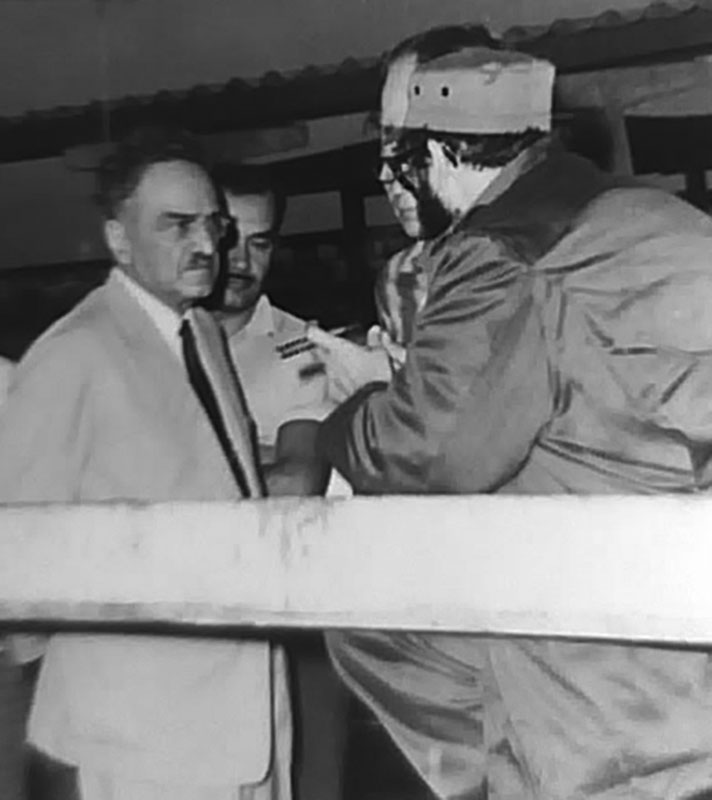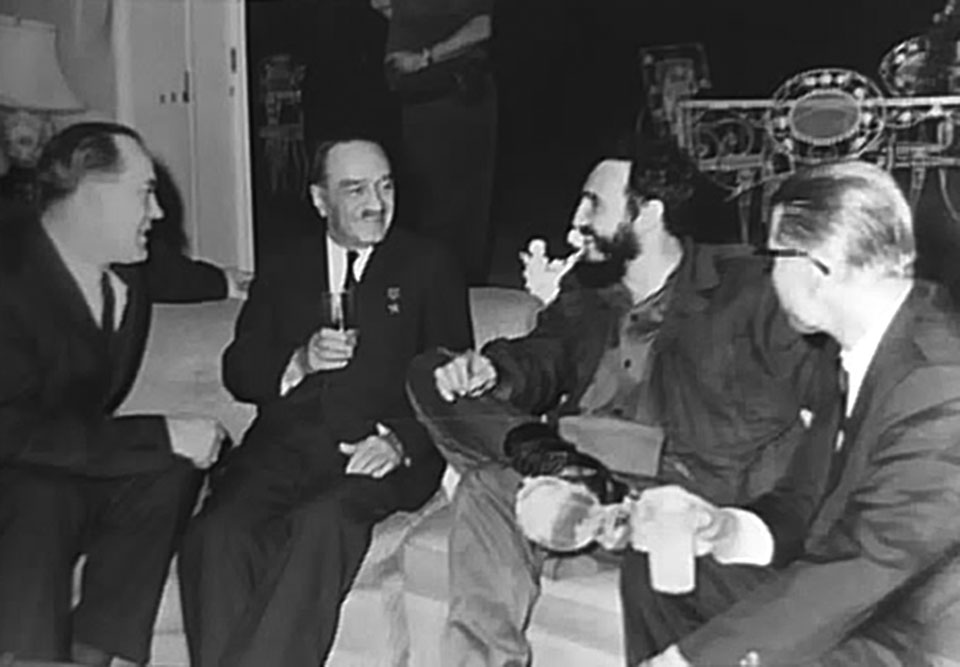 |
| First day in Havana, young Sergo Mikoyan is in the center of the photo. Courtesy of Sergo Mikoyan. |
National Security Archive/Svetlana Savranskaya, Anna Melyakova and Amanda Conrad
DC, October 27, 2012 – The Cuban Missile Crisis continued long after the "13 days" celebrated by U.S. media, with U.S. armed forces still on DEFCON 2 and Soviet tactical nuclear weapons still in Cuba, according to new documents posted today by the National Security Archive (www.nsarchive.org) from the personal archive of the late Sergo Mikoyan. This is the second installment from the Mikoyan archive donated to the National Security Archive and featured in the new book, The Soviet Cuban Missile Crisis.
These documents, which give one an insight into Soviet thinking and decision making at the time of the Cuban Missile Crisis are supplemented with transcripts of extraordinary interviews with key Soviet political and military figures, all of whom have passed away. These interviews were generously provided to the National Security Archive by our long-time partner, Sherry Jones of Washington Media Associates. Sherry, a five-time Emmy Award winner, conducted these interviews in the summer of 1992 for the groundbreaking documentary "Cuban Missile Crisis: What the World Didn't Know," produced by Sherry Jones for Peter Jennings Reporting, ABC News (Washington Media Associates, 1992). [Jump to the interviews]
On October 28, after Khrushchev and Kennedy had just resolved the most acute and public part of the Cuban Missile Crisis, the Soviet leaders decided to send Anastas Mikoyan to Cuba to settle the crisis between the Soviet Union and their ally, Cuba. Fidel Castro, who was not consulted or even informed about the negotiations between the Soviets and the Americans, sent Khrushchev an angry letter "disagreeing" with the policies of the Soviet government. Khrushchev knew he had a real problem in Cuba-with 42,000 Soviet military personnel armed with tactical nuclear weapons-and an emotional revolutionary leader, who felt betrayed and abandoned by the Kremlin.
Khrushchev's three priorities in regard to Cuba at the moment were: to negotiate a smooth withdrawal of the missiles without provoking the Americans; to get Castro to accept inspections because those were the condition for the American non-invasion pledge; and to keep Cuba as a close ally and thus preserve the Soviet Union's legitimacy in the global communist movement.
|
Difficult negotiations. Courtesy of Sergo Mikoyan. |
There was only one person he could turn to with this tall order-his reliable trouble shooter, Anastas Mikoyan. As Fidel Castro put it at a state dinner on November 17, addressing Mikoyan, "Who if not you, and only you, can carry out this mission! If you cannot do this, then it proves that in general this is impossible."
According to Sergo Mikoyan, his father understood his tasks in Cuba to be the following:
First, he had to convince the Cuban leadership that Cuba's security had been assured and that there was no danger of invasion, even though the missiles were being removed.
Second, it was necessary to explain the Kremlin's decisions, which were already announced, and come to an agreement regarding which additional Soviet weapons and military forces could be withdrawn from Cuba with the Cuban leadership's consent, and which should stay on the island.
Third, it was necessary to explain why Khrushchev had agreed to an international ground inspection in Cuba without obtaining Cuba's agreement.
Fourth, it was important to convince the Cuban leaders that this time, in this situation, after such a crisis and such a dangerous moment in international relations, the U.S. President's pledge of non-aggression toward Cuba and his commitment not to allow others to attack Cuba should not be received as yet another empty promise that could be revoked at any moment and under any pretense.
Fifth, it was important to convince Castro to restrain his feelings for some time, even if for a short period, and thus not fire at U.S. surveillance planes.
Sixth, was to return Soviet-Cuban relations as close as possible to their pre-October state.
One may add that the seventh major task was to explain the decisions taken by the Kremlin to their own officers and soldiers, who had not been informed by their own government about the negotiations. Those people, who had worked day and night to assemble the missiles and were preparing to fight and die to defend the Cuban revolution against an imperialist aggression, were certainly surprised by the total turnaround by their government, which seemed to be making one concession after another under U.S. pressure.
|
A lighter moment during the talks. Courtesy of Sergo Mikoyan. |
The documents, published today for the first time, allow us to be a fly on the wall as Mikoyan goes about trying to fulfill his mission-first in New York and then in Havana. We see him as a tough negotiator with John McCloy and Adlai Stevenson, defending the Cuban position, knowing at the same time that Soviet concessions had already been made and that his bargaining position was extremely weak. In Cuba, Mikoyan, faced with Castro's flat rejection of ground inspections, is trying to find a compromise position with inspections by ambassadors from Latin American countries who are already in Cuba. We see how crucial he was in the dynamics of negotiating the end of the Cuban Missile Crisis-at the very nexus of a three-party negotiation, negotiating with the Cubans, privy to all communications between Moscow and its representatives at the U.N., and in daily contact with the Presidium and Nikita Khrushchev himself.
Mikoyan is also very sensitive to the issue of revolutionary legacy and concerned about the effect of the Soviet withdrawal on Chinese influence in Cuba. He is using every "opportune moment" to criticize the Chinese position and draw comparisons between the Soviet willingness to defend Cuba with the real blood and life of its own soldiers and the Chinese efforts to donate blood by their embassy people in Havana. He suggests that if China was serious about helping Cuba, it could have created a distraction-create a crisis around Taiwan, or take over some Portuguese or British bases, like Hong Kong.
In one of Mikoyan's most eloquent moments during the Cuban trip, he addresses the officers of the Pliev group of forces to explain the decisions of the Soviet government. This is one of the first Soviet efforts to spin the results of the Cuban Missile Crisis to make it look as if Khrushchev has envisioned it to turn out just exactly as it did, that the main goal-the defense of the Cuban revolution-has been achieved. Mikoyan assures them that their task has been carried out brilliantly and that the correlation of forces in the world is changing in the Soviets' favor. In this speech, however, there is some real criticism of the way the Soviet military carried out Operation Anadyr. Mikoyan takes a stab at the rocket forces decision makers (Marshall Biryuzov), describing how the Americans discovered the missiles: "they flew the U-2 and discovered that our missiles were sticking up just like they were at a military parade in Red Square. Only in Red Square they would be placed horizontally, and here they were deployed vertically. Apparently, our rocket forces decided to make an offensive gesture to the Americans." More >>


No hay comentarios:
Publicar un comentario